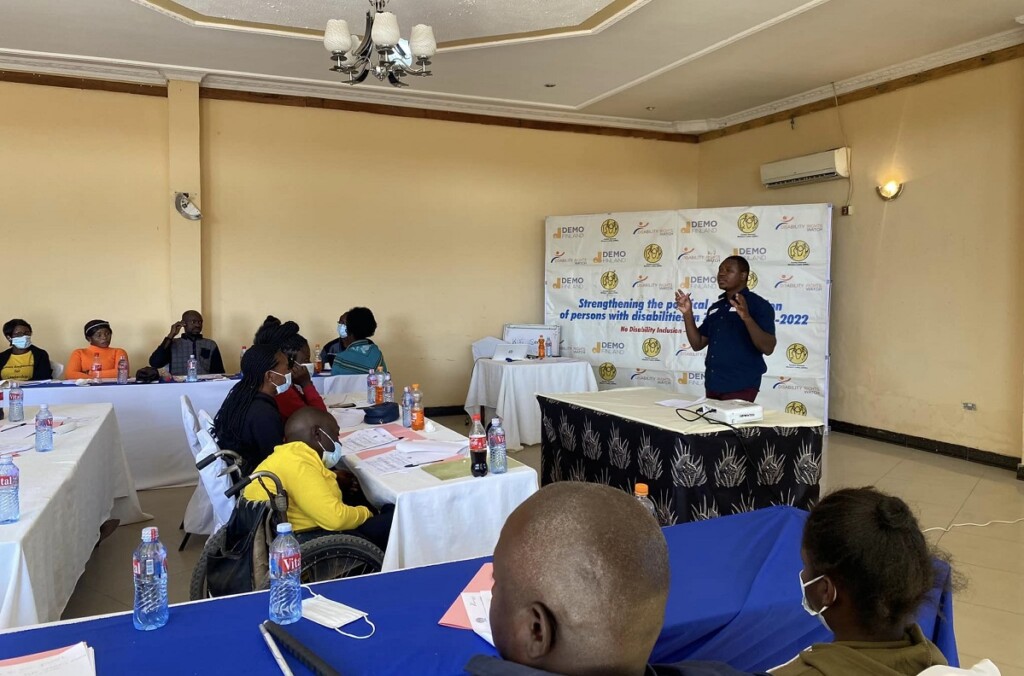
Demo Finland in Zambia
Co-operation started in 2013 (the work on disability inclusion began in 2020).
Partners: Zambia National Women’s Lobby and Disability Rights Watch
The programme aims for a more inclusive multi-party system and builds on the results of our previous programme, which ended in 2024. The political parties involved in the programme have prepared and started implementing disability inclusion plans by mobilising hundreds of persons with disabilities (PWDs) as members and appointing dozens of PWDs to leadership positions in the parties. PWDs involved in the programme have mobilised to work not only with the political parties but also with the electoral authorities. The new programme, which started in 2025, supports political parties in recruiting PWDs as candidates in the 2026 general election, PWDs in standing as candidates and electoral authorities in ensuring inclusive electoral processes. It also supports multi-party co-operation and peer learning on the inclusion of persons with disabilities.
Results of our work
- The Persons with Disabilities Political Dialogue Network (PPDN), established in the previous project phase in two municipalities, went through a registration process in 2024 in order to be able to raise funds independently and continue their activities after the end of the programme.
- The PPDN developed into a multi-party platform in 2024, when a large number of its members joined different political parties.
- The PPDN gave the Electoral Reform Technical Committee a memorandum containing recommendations to review the Constitution of Zambia and the Election Act 2016 and to enhance the electoral code of conduct from a disability perspective. The recommendations were taken into account in the Constitution review process, scheduled to be completed in July 2025.
- Five political parties have recruited 150 persons with disabilities as members, and five political parties have nominated 17 persons with disabilities for leadership positions.
- Seven political parties have drawn up a disability inclusion plan, and six parties have started to implement it.
- Seven political parties have an active disability committee.
Background on Zambia
Zambia has been a multi-party democracy since 1991. The WHO estimates that there are around 2 million persons with disabilities in the country. Despite progressive legislation on disability, persons with disabilities are often an invisible and discriminated group in Zambia. In particular, the conditions for their political participation have been poorly realised, partly due to the lack of will and expertise of political parties to support the participation and inclusion of persons with disabilities in their own activities. The country’s political party legislation is seriously deficient. Political parties are registered under the law on all registered associations, and generally, political parties do not have clear, strong programmes. Consequently, political party documents and structures have also not previously provided for the inclusion of persons with disabilities in party activities. In the last general elections, three persons with disabilities were elected to municipal councils and none to parliament.
- Ranked 80/179 in V-Dem’s Liberal Democracy Index.
- Classified as an electoral democracy* by V-Dem.
- Latest parliamentary election: 2021.
- Women in parliament: 15 %.
- The UN Covenant on Civil and Political Rights was ratified in 1984.
- The UN Convention on the Rights of Women was ratified in 1985.
- The UN Convention on the Rights of Persons with Disabilities was ratified in 2010.
- More information on the state of democracy in Zambia: https://www.idea.int/democracytracker/country/zambia
*In electoral democracies, there are free and fair multi-party elections and satisfactory degrees of human rights and political rights, but not all the criteria of a liberal democracy are met.
